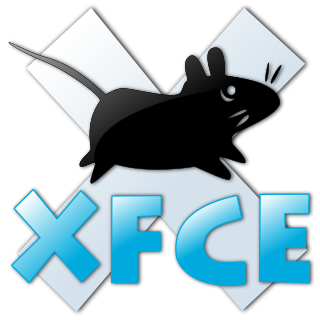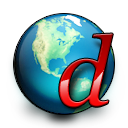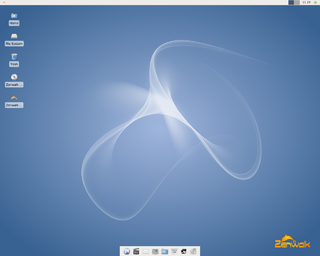
The Common Desktop Environment (CDE) is a desktop environment for Unix and OpenVMS, based on the Motif widget toolkit. It was part of the UNIX 98 Workstation Product Standard, and was for a long time the "classic" Unix desktop associated with commercial Unix workstations.

A Linux distribution is an operating system made from a software collection that is based upon the Linux kernel and, often, a package management system. Linux users usually obtain their operating system by downloading one of the Linux distributions, which are available for a wide variety of systems ranging from embedded devices and personal computers to powerful supercomputers.
In computing, a desktop environment (DE) is an implementation of the desktop metaphor made of a bundle of programs running on top of a computer operating system that share a common graphical user interface (GUI), sometimes described as a graphical shell. The desktop environment was seen mostly on personal computers until the rise of mobile computing. Desktop GUIs help the user to easily access and edit files, while they usually do not provide access to all of the features found in the underlying operating system. Instead, the traditional command-line interface (CLI) is still used when full control over the operating system is required.

Xfce or XFCE is a free and open-source desktop environment for Linux and BSD operating systems.

Dillo is a minimalistic web browser particularly intended for older or slower computers and embedded systems. It supports only plain HTML/XHTML and images over HTTP; scripting is ignored entirely. Current versions of Dillo can run on Linux, BSD, OS X, IRIX and Cygwin. Due to its small size, it is the browser of choice in several space-conscious Linux distributions. Released under the GNU General Public License, Dillo is free software.

Fast Light Toolkit is a cross-platform widget library for graphical user interfaces (GUIs), developed by Bill Spitzak and others. Made to accommodate 3D graphics programming, it has an interface to OpenGL, but it is also suitable for general GUI programming.
Arch Linux is a Linux distribution for computers with x86-64 processors. Arch Linux adheres to the KISS principle and is focused on simplicity, modernity, pragmatism, user centrality, and versatility. In practice, this means the project attempts to have minimal distribution-specific changes, minimal breakage with updates, pragmatic over ideological design choices and focuses on user-centrality rather than user-friendliness.

Lazarus is a free cross-platform visual integrated development environment (IDE) for rapid application development (RAD) using the Free Pascal compiler. Its goal is to provide an easy-to-use development environment for programmers developing with the Object Pascal language, which is as close as possible to Delphi.

Zenwalk is a Desktop focused Linux distribution founded by Jean-Philippe Guillemin. It is based on Slackware with very few modifications at system level making it 100% compatible with it. Zenwalk aims to be a modern and multi-purpose Linux distribution by focusing on Internet applications, multimedia and programming tools. Additionally, Zenwalk comes with many specialized tools, designed for beginner through advanced users as it offers system configuration via both graphical and command-line operations.

Linux is a family of open-source Unix-like operating systems based on the Linux kernel, an operating system kernel first released on September 17, 1991, by Linus Torvalds. Linux is typically packaged in a Linux distribution.
A desktop environment is a collection of software designed to give functionality and a certain look and feel to an operating system.
GNU variants are operating systems based upon the GNU operating system. According to the GNU project and others, these also include most operating systems using the Linux kernel and a few others using BSD-based kernels.
In computing, Nano-X is a windowing system which is full featured enough to be used on a PC, an embedded system or a PDA. It is an Open Source project aimed at bringing the features of modern graphical windowing environments to smaller devices and platforms. The project was renamed from Microwindows due to legal threats from Microsoft regarding the Windows trademark.

GTK is a free and open-source cross-platform widget toolkit for creating graphical user interfaces (GUIs). It is licensed under the terms of the GNU Lesser General Public License, allowing both free and proprietary software to use it. Along with Qt, it is one of the most popular toolkits for the Wayland and X11 windowing systems.

GNOME is a free and open-source desktop environment for Unix-like operating systems. GNOME was originally an acronym for GNU Network Object Model Environment, but the acronym was dropped because it no longer reflected the vision of the GNOME project.

The Fast Light Window Manager is a stacking window manager written in C++ and available for redistribution under the terms of the GNU General Public Licence. FLWM is the default window manager for Tiny Core Linux.

MATE is a desktop environment composed of free and open-source software that runs on Linux and BSD operating systems. An Argentine user of Arch Linux started the MATE project to fork and continue GNOME 2 in response to the negative reception of GNOME 3, which had replaced its traditional taskbar with GNOME Shell. MATE aims to maintain and continue the latest GNOME 2 code base, frameworks, and core applications.

Cinnamon is a free and open-source desktop environment for the X Window System that derives from GNOME 3 but follows traditional desktop metaphor conventions. Cinnamon is the principal desktop environment of the Linux Mint distribution and is available as an optional desktop for other Linux distributions and other Unix-like operating systems as well.

Manjaro is a free and open-source Linux distribution based on the Arch Linux operating system. Manjaro has a focus on user friendliness and accessibility, and the system itself is designed to work fully "straight out of the box" with its variety of pre-installed software. It features a rolling release update model and uses Pacman as its package manager.














